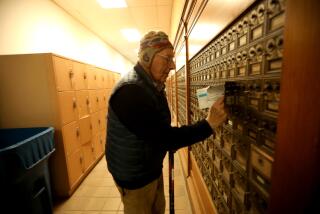Big-City Ad Sparks Miniature Boom in Neighborly Oregon Farm Town
- Share via
CONDON, Ore. — Two types of folks live in the little town that could: the mighty neighborly, who smile and wave at everybody, and the recently arrived, who hope to be considered mighty neighborly any day now.
“People drive along the road around here, and they wave to me, and they don’t know me from Adam,” said recent arrival Theodore Keifer, a retiree who traded big city life in New Orleans for eastern Oregon’s yellow wheat and dark tilled earth. “I’ve got to get in the habit of waving back.”
So do the other new folks in town. The latest population count in Condon and environs: mighty neighborly, 710; recently arrived: 28. Darned dramatic numbers for a town that lost 263 people in 10 years.
Chalk it up to a firecracker of a promotion campaign that went off like an A-bomb.
One-Inch Ad
It all started in April when the local real estate agent, the newspaper editor, the district attorney and the telephone company manager, discouraged by declining population and futile efforts to attract new industry, plunked down $113.92 for a one-inch advertisement in the Los Angeles Times asking for a “few good residents” for their gutsy, good-hearted farm town.
The news media, which dearly love yarns about gutsy, good-hearted farm towns, shot the story around the world. In a flash, the Gilliam County seat became renowned as the little town that could, puffing up the hill of economic adversity with a cheerful, I-think-I-can attitude.
“It hit a nerve. That’s all it amounts to; it just hit a nerve,” said William Berray, manager of Home Telephone’s Condon office.
He has proof, neatly logged and filed in cardboard boxes: more than 2,000 inquiries from across the United States and five foreign countries. A precise, single-page breakdown, labeled “Response Demographics,” estimates that 78% of the curious wrote and 20% called. At least 200 people drove through.
‘Promise to Be Good’
“We all had our feet in it, our knees, our waists, wading through the responses,” said Boyd Harris, the real estate agent, who has had 70 home showings in Condon and Fossil, an economically strapped town in Wheeler County, about 20 miles south.
Most people just wanted some information about Condon, said Mac Stinchfield, editor of the local newspaper, The Times-Journal. “Probably half or so added a paragraph to two or three pages on their qualifications: ‘We promise to be good neighbors, and we treat our pets well, and let us know what we need to do to become part of your community--we’ll change.’ ”
In all the mail, they had only two or three crank letters, including one from the American Nazi party. A fellow in Eugene wrote, saying he wanted to start a factory to produce a sure-fire cure for hemorrhoids.
“We’re still not sure that one is a crank. We haven’t been able to decide,” Berray said.
No Work to Offer
They have had to discourage some people: Condon, with its farm-based economy, has no work to offer, which is most of its problem.
Harris told this story:
“I had a fellow call me and say, ‘Boyd, the station wagon’s loaded; the kids and I are getting in the car in the morning, and we’re coming to Condon.’ And I said, ‘Wait a minute. What are your expectations?’ And he said, ‘I’ve got $200 to put down for a house; I can pay $100 a month, and I need a job.’ I said, ‘Partner, you’re coming to the wrong town.’ ”
It’s the right town for retirees, with its nine-hole golf course, nearby hunting and fishing, and lack of crime. It’s the right town for people with a little capital to create opportunities, and it’s the right town for children, with plenty of clean air, a big swimming pool and schools that send 85% of their students to college.
“What you have to be is a person who’s willing to live in a peaceful, quiet town and accept that and not expect a lot of things,” said Pat Wolke, local district attorney and the only lawyer in Gilliam County.
Letters Still Arrive
People who still think Condon might be the right place for them are on their second or third round of correspondence, and 10 or 15 letters come in a week.
Berray shakes his head in disbelief. “We would have been tickled to death with 50 or 60 responses,” he said. “We were looking for 10 families in an 18-month period . . . and we’ve already accomplished that.”
And more. A new furniture store opened this month and gave away a couch in a “grand opening” drawing. The restaurant-lounge is about to change hands and may start serving breakfast again. Deals have been struck on 15 houses. An airstrip is under construction; Main Street has been repaved, and some storefronts untouched for 30 years or more have spiffy new faces.
Condon, whose slogan is “It’s the People,” feels pretty good about itself these days.
‘They’ll Come’
“I think maybe the people who live in these towns don’t appreciate them,” Wolke said. “They feel like it’s just little old Condon, nobody would want to come here. But really there are a lot of people who want somebody to want them. And if a town actually goes through the trouble and the effort of soliciting people like this . . . they’ll come and look. And if it meets their expectation, they’ll stay.”
Retirees Julius and Ellen Hardy, lured by the promise of cheap housing, came, looked and stayed. They bought a ranch house and dug a garden for tomatoes and dahlias.
On Wednesday afternoons, Ellen Hardy’s neighbor drives her to prayer meeting at the 17-member Seventh-day Adventist Church, a luxury she could never indulge in Chehalis, Wash., because she had no way to get there. When they moved down in July, the lady around the corner cooked them dinner.
“They’re very nice and friendly. Everybody stops to speak to you,” Hardy said with a touch of amazement in her voice. “That’s what it says on the signs--’It’s the People.’ And it is.”
More to Read
Sign up for Essential California
The most important California stories and recommendations in your inbox every morning.
You may occasionally receive promotional content from the Los Angeles Times.













